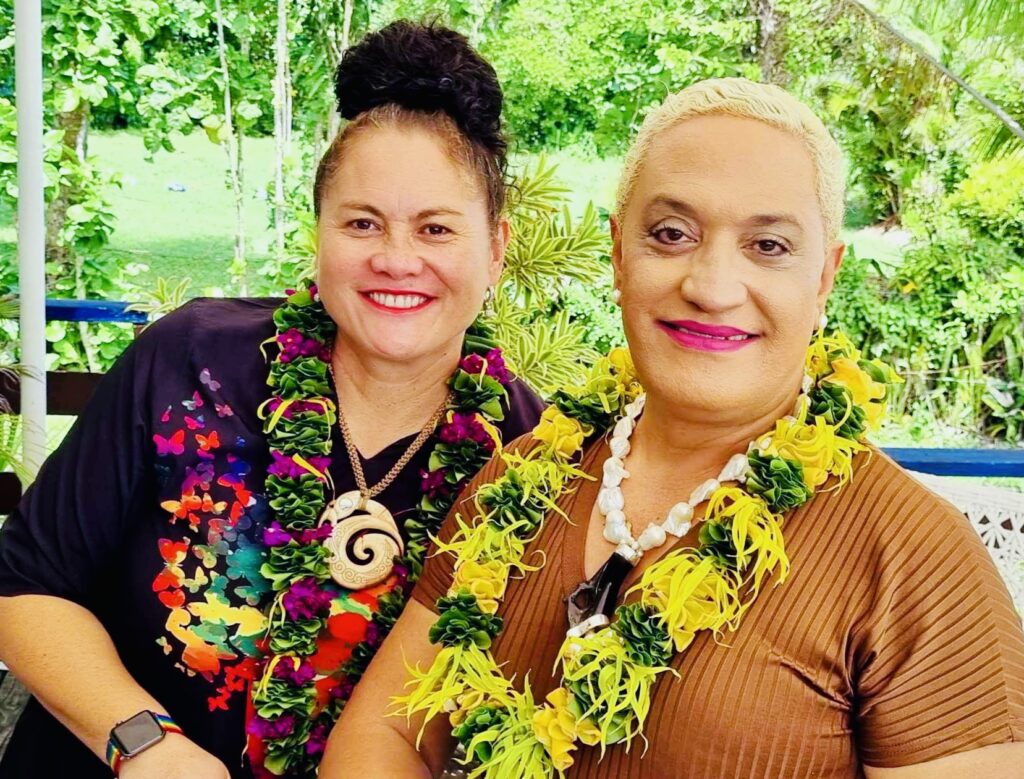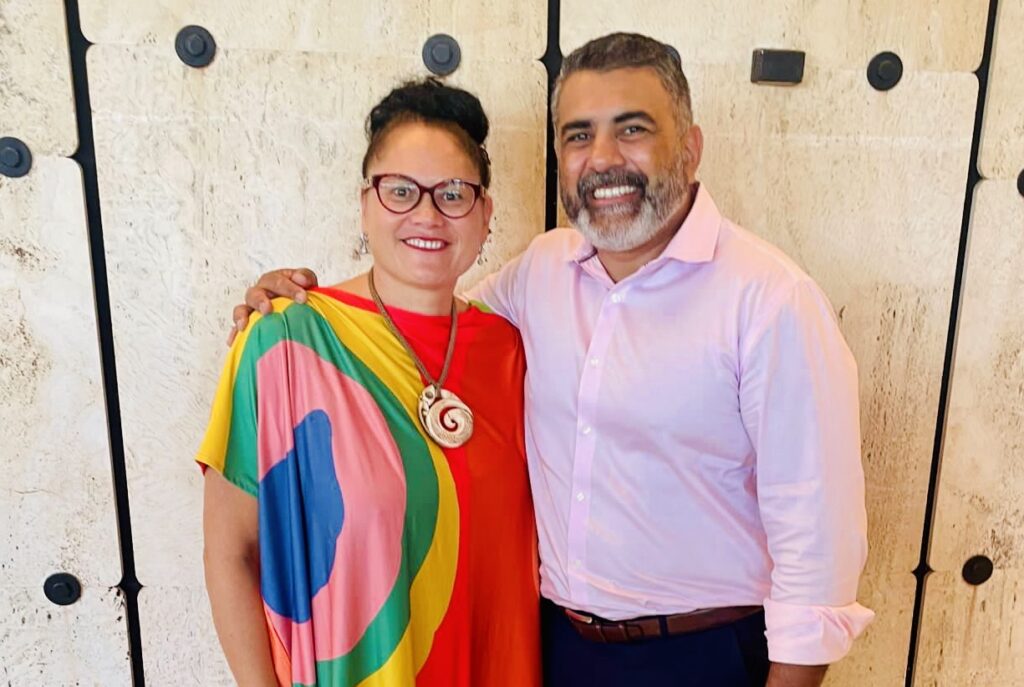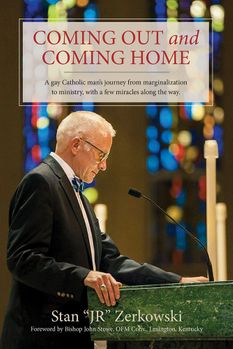Ever heard that LGBTQ people are a modern phenomenon? Let me set the record straight: People of diverse sexual orientations and gender identities have been part of Indigenous cultures and Pacific Island traditions forever.
These communities have always valued and celebrated the beautiful diversity of human sexuality and gender expression. Indigenous communities, such as the Tangata whenua, a Māori term that designates “people of the land,” have long recognized and honored the concept of takatāpui. (“Takatāpui” is a Māori word similar to LGBTQ.)
In 1849, the famed New Zealand scholar Te Rangikāheke published a story shedding light on the cultural acceptance of diverse relationships among Māori people. He used a historical tale to portray intimate relations between members of the same-sex.
Despite historical acceptance in many cultures, sexually diverse Indigenous peoples continue to face multiple layers of discrimination and marginalization.
As we navigate the complex intersections of identity and heritage, it becomes increasingly evident that the impact of colonialism has left deep imprints on the lives and rights of Indigenous communities worldwide.
The impact of colonialism
From cultural erasure to forced assimilation, the oppressive systems aimed at subjugating and destroying Indigenous existence, culture and concepts have undermined the very fabric of our societies and identities. The resilience and determination of diverse Indigenous peoples in the face of ongoing challenges serves as a beacon of inspiration.
Despite historical acceptance in many cultures, sexually diverse Indigenous peoples continue to face multiple layers of discrimination and marginalization. Denied their right to free, prior and informed consent, our voices are silenced, and decisions concerning our lives and communities are often made without our involvement or consultation.
The legacy of colonialism perpetuates intersectional discrimination against non-heterosexual Indigenous individuals, both from within our own communities and from wider society. Prejudice, stigma and violence remain pervasive, hindering our access to education, healthcare and employment opportunities. This systemic discrimination not only violates our human rights but also impedes the overall development and well-being of Indigenous peoples as a whole.

In response to these challenges, Indigenous peoples have taken up the mantle of change, advocating for inclusivity, acceptance and respect within our communities. Efforts to reclaim our identities and expressions of our ancestors are underway, as we work to foster dialogue and challenge harmful norms perpetuated by colonial legacies.
There are ways in which we can restore what was lost. In New Zealand, the publication of a booklet assembling Māori words and phrases that describe non-heterosexual identities signifies a commitment to re-indigenizing ourselves. This small yet significant step speaks to our collective role supporting processes of decolonization. By acknowledging and celebrating the inherent rights of takatapui individuals, we affirm our Indigenous right to exist and thrive.
The legacy of colonialism perpetuates intersectional discrimination against non-heterosexual Indigenous individuals, both from within our own communities and from wider society.
Recent successes in decriminalization, locally led within particular cultural and religious contexts, highlight the progress being made in addressing systemic discrimination and marginalization. In this context, the recognition and support of non-heterosexual whanaunga (or extended family) across the Pacific reflect a broader commitment to empowering diverse individuals within Indigenous communities.
A need for change
Colonial legacies have further compounded the struggle for LGBTQ rights within Pacific and Indigenous communities. The imposition of Western norms has often marginalized and erased Indigenous sexual and gender diversity. However, there is a growing movement to reclaim and celebrate non-heterosexual Indigenous identities, fueled by a renewed commitment to decolonization and cultural revitalization. A disproportionately high suicide rate among Pacific Islanders underscores the urgent need for support and advocacy.
Recent years have seen increased recognition of the rights and experiences of non-heterosexual communities in international forums like the Expert Mechanism on the Rights of Indigenous Peoples, established by the U.N. Human Rights Council. Panels and discussions have shed light on the impact of colonialism on these rights within Indigenous communities, fostering dialogue and solidarity among diverse identities.
However, meaningful change requires concerted action from states, Indigenous peoples and religious institutions. Governments must enact and enforce comprehensive anti-discrimination laws that explicitly protect non-heterosexual and gender diverse individuals. Culturally sensitive policies, education and awareness initiatives are essential in promoting understanding and acceptance within communities.
Despite significant ongoing challenges, and a global pushback on the rights of LGBTQ people, there are also beacons of hope and progress around the world.
Engagement with religious institutions is also crucial, as teachings that marginalize and stigmatize non-heterosexual individuals perpetuate ongoing abuse and violence. By challenging these harmful norms and promoting inclusivity, we can create spaces for dialogue and reconciliation, fostering a future where the rights of non-heterosexual Indigenous people are fully respected, protected and celebrated.
Religious institutions are therefore called upon to uphold the values of love, compassion and the inherent dignity of all individuals, regardless of their sexual orientation, gender identity, gender expression or sex characteristics (SOGIESC).
This challenge calls for a commitment to affirming the inherent worth of every person, advocating for the decriminalization of unjust laws and providing pastoral care and support tailored to the unique needs of LGBTQ individuals. Embracing these principles not only aligns with the teachings of Christ but also ensures that every member of society feels seen, heard and valued within their faith communities.

As leaders entrusted with guiding their congregations, religious representatives have the opportunity to create spaces where love, acceptance and justice prevail, ultimately enriching the lives of all who seek solace and belonging within their spiritual communities. This includes fostering interfaith dialogue and engaging with Indigenous leadership and peoples of diverse SOGIESC to ensure inclusivity and understanding across all facets of society.
Signs of hope and progress
Despite significant ongoing challenges, and a global pushback on the rights of LGBTQ people, there are also beacons of hope and progress around the world.
A recent landmark Supreme Court decision in Mauritius to decriminalize same-sex relations among consenting adults is a crucial step forward for equality. The ruling evoked the principle of equality and recognized that criminalizing homosexuality was an imposition of the British colonial project, not an expression of Indigenous Mauritian values.
The recognition of LGBTQ rights in Mauritius, alongside other African nations, signifies progress toward dismantling colonial-era discrimination. I pray this continues.
This judgment signifies that all individuals, regardless of sexual orientation or gender expression, are valued and protected under the rule of law. The recognition of LGBTQ rights in Mauritius, alongside other African nations, signifies progress toward dismantling colonial-era discrimination. I pray this continues.
Similarly, a 2023 decision in the Cook Islands to decriminalize consensual same-sex adult relationships marked a significant milestone in the global struggle for LGBTQ rights. The repeal of laws inherited from the British colonial period reflects a growing recognition of the importance of equality and inclusion in Pacific Island nations.
During my visits last year to Pacific Island countries—including Tonga, Vanuatu, Papua New Guinea, the Solomon Islands and Samoa—, I emphasized my commitment to supporting and collaborating with advocates and activists in the region. These advocates use the acronym MVPFAFF+, coined by the Niuean-born activist Phylesha Brown-Acton to denote non-heterosexual identities particular to the Pacific Islands.
These engagements facilitated conversations on the unique challenges faced by these communities, identifying ways to foster collaboration, strategizing for LGBTQ law reform and seeking support for the community by both governments and parliament.
In my experience, parliamentarians play a crucial role, both domestically and internationally, in supporting and advancing LGBTQ rights reforms. By championing legislation that promotes equality and inclusion, parliamentarians can contribute to the dismantling of discriminatory laws and practices.
They can advocate for the recognition of LGBTQ rights as fundamental human rights, ensuring that all individuals, regardless of their sexual orientation or gender expression, are protected under the law. Additionally, parliamentarians can use their platforms to raise awareness about the unique challenges faced by LGBTQ communities, and advocate for policies and programs that address these challenges.
In my experience, parliamentarians play a crucial role, both domestically and internationally, in supporting and advancing LGBTQ rights reforms.
By engaging in dialogue with advocates and activists, as well as with government officials and fellow parliamentarians, they can build momentum for reform and create a supportive environment for LGBTQ advancement.
As we continue to advocate for acceptance and rights, it is essential to honor and celebrate the resilience and diversity of LGBTQ Indigenous peoples worldwide. Only through collective action, solidarity, love, compassion and a fundamental belief in the dignity of all human beings can we create a world where everyone, regardless of their sexual orientation or gender identity, can live authentically.
My personal journey
I have personal experience with this topic. In my early 20s, while playing rugby for New Zealand, my native country, I finally felt comfortable coming out to my family. Thankfully, my parents were supportive.
But it was a conversation with my late father that truly changed my perspective. He asked me, “Are you aware of the life you are choosing?” His concern was palpable; he was worried about the discrimination I might face and my potential to achieve my dreams. I replied, “I’m not choosing this life. This is who I am.”
His response was profound. He assured me of his love but wanted me to understand the challenges of living as a takatāpui woman. It was a moment of empowerment, realizing that I could live authentically, free from the burden of others’ opinions.
“I’m not choosing this life. This is who I am.”
The impact of colonial legacies on the rights of LGBTQ Indigenous peoples demands our attention and our action. By upholding the principles of the United Nations Declaration on the Rights of Indigenous Peoples, we can forge a path towards global decolonization, justice, equality and empowerment.
Together, let us work towards a future where every individual has the right to a welcoming and inclusive environment, regardless of sexual orientation, gender expression or Indigenous heritage. It’s crucial to recognize that being Takatapui, Two Spirit, MVPFAFF+ or LGBTQ is an authentic Indigenous expression, and those who support Indigenous rights should also advocate for the rights of these communities.



